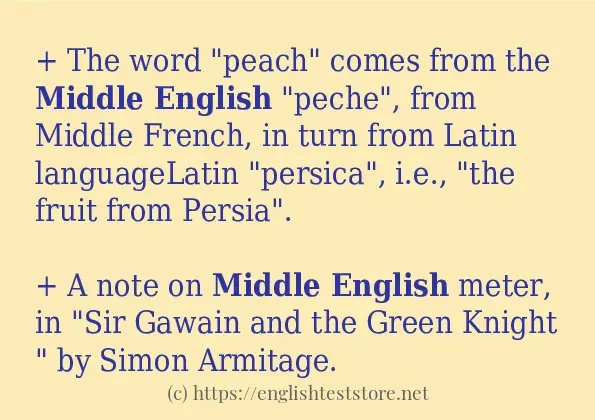How to use in-sentence of “Middle english”:
+ The word “peach” comes from the Middle English “peche”, from Middle French, in turn from Latin languageLatin “persica”, i.e., “the fruit from Persia”.
+ A note on Middle English meter, in “Sir Gawain and the Green Knight ” by Simon Armitage.
+ The Italian city’s name, Genoa, was spelled “jene” in Middle English and “Gênes” in the French language.
+ Or it may come from the past participle of the Middle English verb “crumpen”, which means to curl up.
+ After more sound changes, Middle English became Modern English.
+ An example of a sound change in English languageEnglish is the Great Vowel Shift, when all of the long vowel sounds in Middle English changed into what they are today.
+ The word of crumpet may come from the Middle English word “crompid”.

Example sentences of “Middle english”:
+ This is from Middle English "ladebord" and the term "lade" is related to the modern "load".
+ That is in Middle English 1066 to the middle/late 1400s.
+ This is from Middle English “ladebord” and the term “lade” is related to the modern “load”.
+ That is in Middle English 1066 to the middle/late 1400s.
+ The word “inch” came from Middle English “unche”, which came from Old English “ynce”, from Latin “uncia” meaning “a twelfth part”.
+ It changed into Middle English from about the 11th century.
+ Old English gradually turned into Middle English after the Norman Conquest of 1066.
+ The word manure came from Middle English “manuren” meaning “to cultivate land” and initially from French “main-oeuvre” = “hand work” alluding to the work which involved manuring land.
+ In addition, the manuscripts are important sources for the history of the English language; in particular, the later Peterborough Chronicle is one of the earliest examples of Middle English in existence.
+ The word originated in late middle English meaning “at the same time”.
+ The word “mattress” came from Arabic languageArabic words meaning “to throw” and “place where something is thrown” or “mat, cushion.” During the Crusades, Europeans slept on cushions thrown on the floor, and the word “materas” eventually became Middle English through the Romance languages.
+ The name “Tuesday” comes from a Middle English word, “Tiwesday”.
